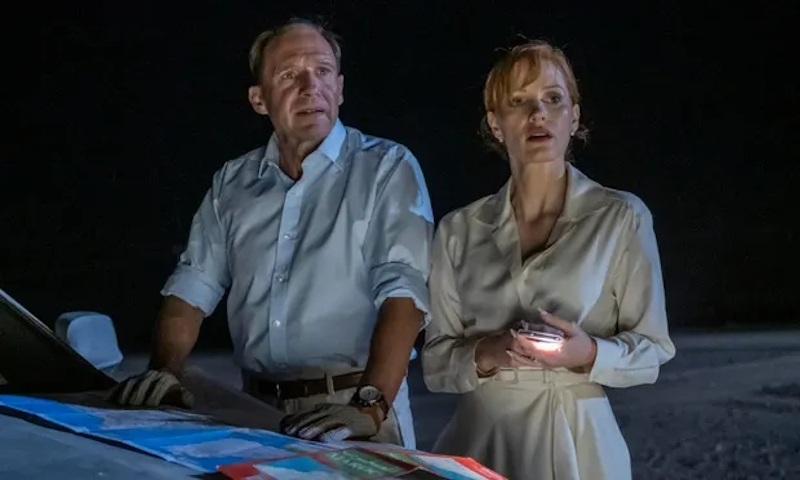Director – John Michael McDonagh – 2021 – UK/Ireland – Cert. 18 – 117m
****
A wealthy alcoholic driving to a rich school friend’s party in the Sahar desert accidentally kills a local and sparks a cross-cultural incident that will have profound consequences for him – out in UK cinemas on Friday, September 2nd
Wealthy married couple David and Jo Henninger (Ralph Fiennes and Jessica Chastain) travel to Tangier in what he calls “ah – l’Afrique” to attend a rich friend’s party at his isolated home in the middle of the Sahara. This involves driving some 400 miles through poorly mapped desert terrain. David is a high-functioning alcoholic (“I’ve always thought the high-functioning should cancel out the alcoholic”, he says) who indulges himself from a bottle before he starts to drive and the couple argue a great deal. Perhaps their relationship is nearing its end.
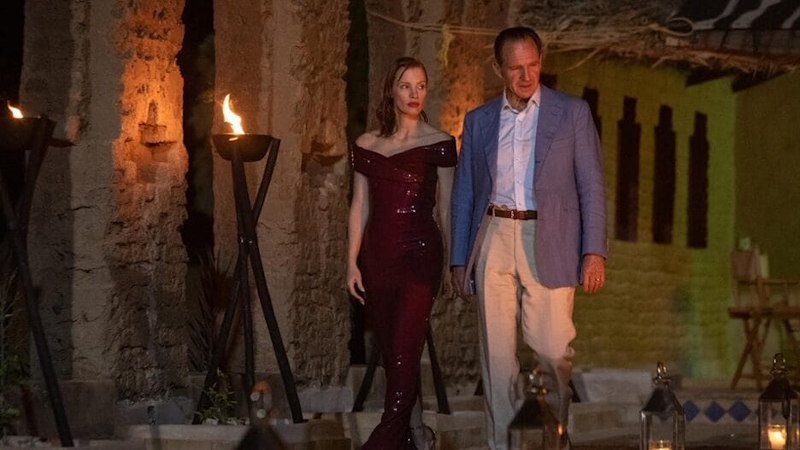
En route, they get lost, but in the middle of the night eventually find the turn off. They stop, bicker, then start up again and immediately hit local teenager Driss (Omar Ghazaoui) who has stepped out in front of the stationary car to sell them a fossil. Burying his ID, they bundle his dead body into the car hoping that their host will know what to do.
When they arrive at the ksour (“castle”), their host Richard (Matt Smith) immediately takes charge, phoning the police and reassuring the couple that it’ll be recorded as a an accident and everything will be fine. Meanwhile, he and his partner Dally (Caleb Landry Jones from Nitram, Justin Kurzel, 2022) have a party and guests requiring their attention. Their residence is lavish, with no expense spared, and their many wealthy guests are intent on having a good time.
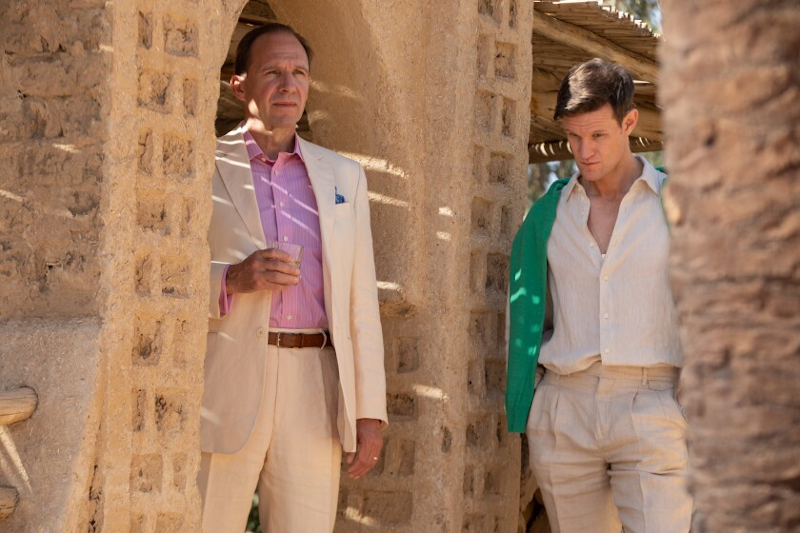
Richard’s indigenous staff, headed up by the loyal but astute Hamid (Mourad Zaoui), include an unseen chef who prepares the finest local cuisine. The staff watch silently as the privileged Westerners party with no regard for anyone else. The distressed David and Jo understandably have trouble getting into the spirit of the thing.
To everyone’s relief, the police react much as Richard has predicted and leaving aside any sense of guilt or responsibility the couple might feel, everything seems cut and dried until the victim’s father Abdellah (Ismael Kanater) shows up to claim the body and ask that David accompany him to the burial.
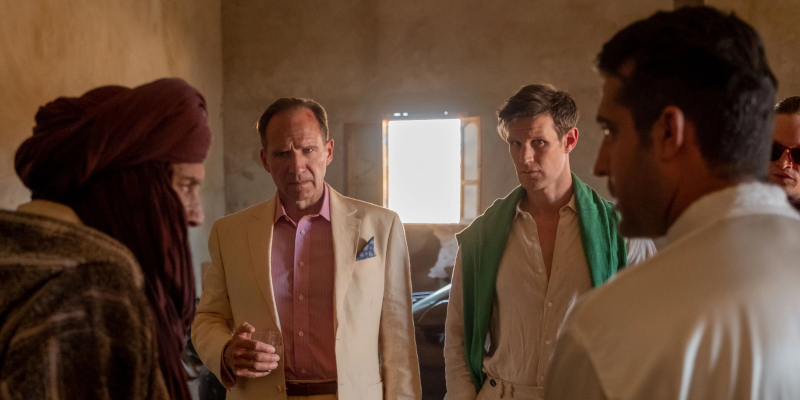
This involves another lengthy, cross-desert journey, this time in Abdellah’s heavy-duty jeep driven by his companion Anouar (Saïd Taghmaoui from Wonder Woman, Patty Jenkins, 2017; John Wick: Chapter Three – Parabellum, Chad Stahelski, 2019 and, more significantly, La Haine, Matthieu Kassovitz, 1995). Increasingly upset by the whole thing, and with everyone including himself wondering if he’ll come back alive, David agrees to go.
From this point, the narrative splits into two, David’s journey with Abdellah, Anouar and the son’s corpse and his accompanying emotional and spiritual odyssey contrasted with the cocaine and sex-fuelled, hedonistic activities of Richard, Dally and their guests, including self-obsessed, financial guru Tom (Christopher Abbot from Possessor, Brandon Cronenberg, 2020; Black Bear, Lawrence Michael Levine, 2020) with whom she eventually pairs off in her husband’s absence, observed through her bedroom door by the watchful Hamid…
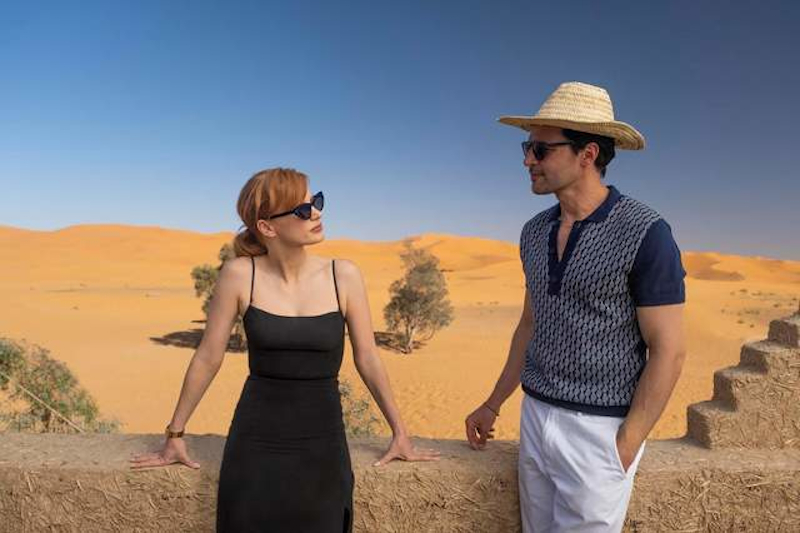
Something odd happens when watching familiar actors who one has admired in many films playing unlikeable characters: a simultaneous repulsion at the characters themselves and a fascination as the actors playing them grapple with nuances and attempt to find redeeming features. All the Westerners portrayed here possess obscene sums of money and have chosen to spend it on their own lifestyle rather than channelling it into any sort of social good.
Admittedly, it’s true that host Richard has provided employment at his ksour for a number of local people, although you can’t help but feel these locals resent rich Westerners coming to their country to lord it over them. Yet, to watch these rich people going about their untroubled lives even as they justify their actions to themselves is strangely compelling.
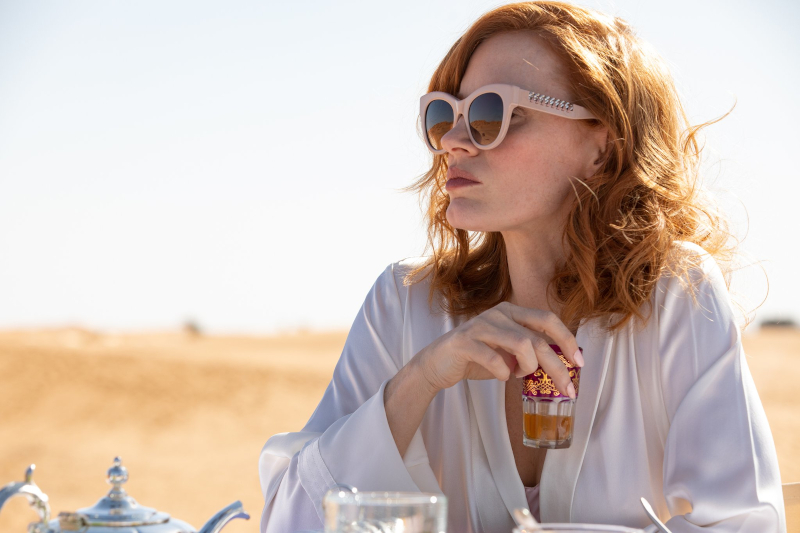
Jo may be in the process of untangling herself from a soured marriage, but it’s hard to know what exactly she wants in its place. Certainly, her position as a privileged Westerner is never in doubt. Has she ever thought of herself as a woman able to stand up tall outside the presence of a nearby man?
David, the self-proclaimed high-functioning alcoholic, is arguably the more interesting of the pair. The couple’s relationship has reached a point where his addiction to booze is out in the open for all to see, and his long-suffering wife is clearly disgusted with it. It costs him dear, too, because it’s a hugely contributing factor to his running over the local boy in a moment of bad judgement.
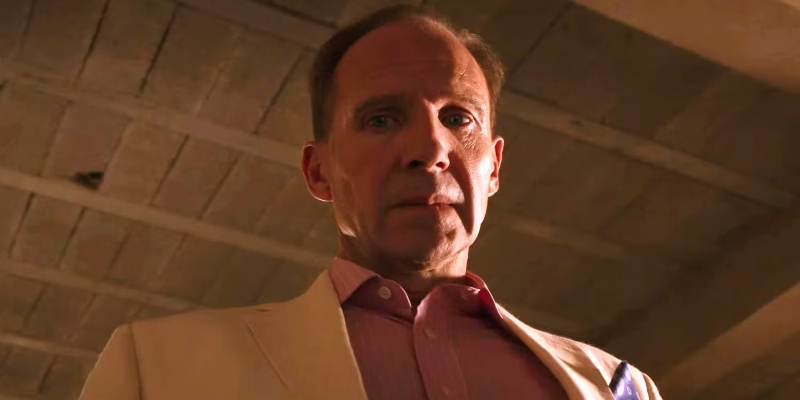
Afterwards at the ksour, and later still on the burial-bound trek with the boy’s father, he is still coming to terms with the fact that, even though it was clearly an accident and there will be no legal consequences, he has been directly responsible for another person’s death, however much the victim’s personal lack of judgement (in stepping into the path of an oncoming car at night believing he will be seen in time for it to stop) may also have been a contributing factor.
The narrative (adapted by McDonagh from Lawrence Osborne’s 2012 novel) allows David to explore his situation through time spent being driven with the boy’s father (an austere and distant but ultimately warm portrayal by Kanater) and his driver ( a nicely judged Taghmaoui) which ultimately leads to his own spiritual catharsis.
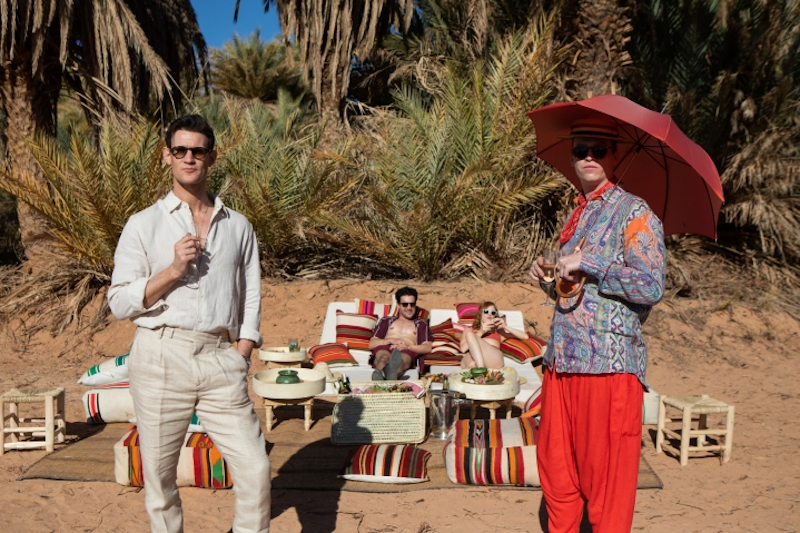
The worlds of the rich, hedonistic, post-Christian Westerners and the comparatively poor, Islamic desert dwellers are poles apart, and the tension is palpable right through the film. It’s also at the centre of Fiennes performance, which puts the audience through an emotional meat-grinder as he struggles to come to terms with what happened and his responsibility for it.
The not entirely unexpected ending is fast if effective, and the film loads all it’s credits onto the opening titles (as movies always used to do) so that the denouement can quickly wrap up the proceedings with the words The End, something which proves quite refreshing in a contemporary movie even though, decades ago, it would have been commonplace.
As the title suggests, the concept of forgiveness is central to all this, as you might expect given the Catholic sensibilities of British/Irish director McDonagh (as can be seen in his Calvary, 2014), but whether David forgives himself or is forgiven by others, particularly those of the alien culture in which all this occurs, is open to question.
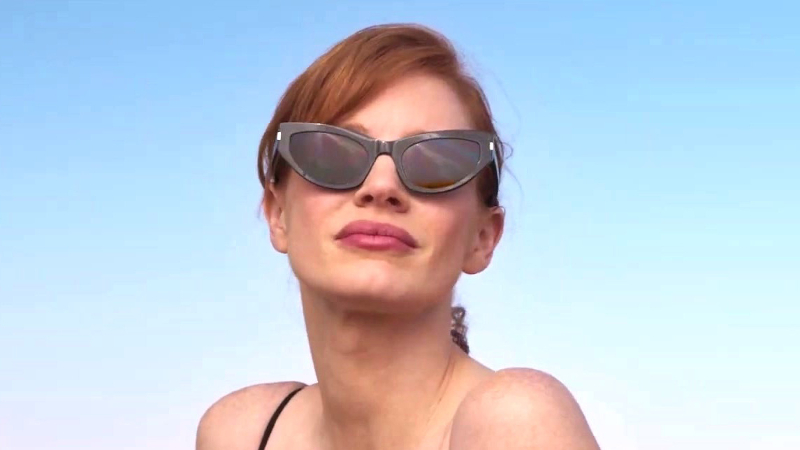
As for Jo, even though she clearly bears some responsibility as an accomplice to an alcoholic at the wheel she seems to shrug this off to merely recalibrate her rich, hedonistic lifestyle. She may have to all intents and purposes dumped her husband by the end, but the whole guilt / responsibility journey he has undergone seems like mere water off a duck’s back as far as she is concerned.
An extraordinary look at human beings’ capacity for either self-deception on the one hand or their ability to face up to what they really are and the bad things they do or cause to happen on the other – even as it contrasts two every unequal and vastly different cultures and lifestyles. Equal parts reprehensible, fascinating and compelling.
The Forgiven is out in cinemas in the UK on Friday, September 2nd.
Trailer:
